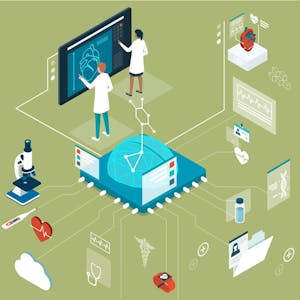Fundamentals of Machine Learning for Healthcare
Machine learning and artificial intelligence hold the potential to transform healthcare and open up a world of incredible promise. But we will never realize the potential of these technologies unless all stakeholders have basic competencies in both healthcare and machine learning concepts and principles. This course will introduce the fundamental concepts and principles of machine learning as it applies to medicine and healthcare. We will explore …
Fundamentals of Machine Learning for Healthcare
Machine learning and artificial intelligence hold the potential to transform healthcare and open up a world of incredible promise. But we will never realize the potential of these technologies unless all stakeholders have basic competencies in both healthcare and machine learning concepts and principles. This course will introduce the fundamental concepts and principles of machine learning as it applies to medicine and healthcare. We will explore machine learning approaches, medical use cases, metrics unique to healthcare, as well as best practices for designing, building, and evaluating machine learning applications in healthcare.
The course will empower those with non-engineering backgrounds in healthcare, health policy, pharmaceutical development, as well as data science with the knowledge to critically evaluate and use these technologies.
Co-author: Geoffrey Angus
Contributing Editors: Mars Huang Jin Long Shannon Crawford Oge Marques
The Stanford University School of Medicine is accredited by the Accreditation Council for Continuing Medical Education (ACCME) to provide continuing medical education for physicians. Visit the FAQs below for important information regarding 1) Date of original release and Termination or expiration date; 2) Accreditation and Credit Designation statements; 3) Disclosure of financial relationships for every person in control of activity content.
Define important relationships between the fields of machine learning, biostatistics, and traditional computer programming.
Learn about advanced neural network architectures for tasks ranging from text classification to object detection and segmentation.
Learn important approaches for leveraging data to train, validate, and test machine learning models.
Understand how dynamic medical practice and discontinuous timelines impact clinical machine learning application development and deployment.
Syllabus
Syllabus - What you will learn from this course
Week 1
Why machine learning in healthcare?
Week 2
Concepts and Principles of machine learning in healthcare part 1
Week 3
Concepts and Principles of machine learning in healthcare part 2
Week 4
Evaluation and Metrics for machine learning in healthcare
Week 5
Strategies and Challenges in Machine Learning in Healthcare
Week 6
Best practices, teams, and launching your machine learning journey
Week 7
Course Conclusion
FAQ
When will I have access to the lectures and assignments?
Access to lectures and assignments depends on your type of enrollment. If you take a course in audit mode, you will be able to see most course materials for free. To access graded assignments and to earn a Certificate, you will need to purchase the Certificate experience, during or after your audit. If you don't see the audit option:
The course may not offer an audit option. You can try a Free Trial instead, or apply for Financial Aid.
The course may offer 'Full Course, No Certificate' instead. This option lets you see all course materials, submit required assessments, and get a final grade. This also means that you will not be able to purchase a Certificate experience.
What will I get if I subscribe to this Specialization?
When you enroll in the course, you get access to all of the courses in the Specialization, and you earn a certificate when you complete the work. Your electronic Certificate will be added to your Accomplishments page - from there, you can print your Certificate or add it to your LinkedIn profile. If you only want to read and view the course content, you can audit the course for free.
Is financial aid available?
Yes. In select learning programs, you can apply for financial aid or a scholarship if you can’t afford the enrollment fee. If fin aid or scholarship is available for your learning program selection, you’ll find a link to apply on the description page.
Is this activity accredited for Continuing Medical Education (CME)?
Dates and Duration
Original Release Date: 08/10/2020
Expiration Date: 08/10/2023
Estimated Time to Complete: 11 hours
CME Credits Offered: 11.00
Accreditation
The Stanford University School of Medicine is accredited by the Accreditation Council for Continuing Medical Education (ACCME) to provide continuing medical education for physicians.
The Stanford University School of Medicine designates this enduring material for a maximum of 11.00 AMA PRA Category 1 Credits™. Physicians should claim only the credit commensurate with the extent of their participation in the activity.
Disclosures
The Stanford University School of Medicine adheres to ACCME Criteria, Standards and Policies regarding industry support of continuing medical education. There are no relevant financial relationships with ACCME-defined commercial interests for anyone who was in control of the content of this activity.
Reviews
it is a really good course for learning ML but some of the videos are a bit hard to fully understand
Interesting and well crafted, it is mostly at an introductory level, but accurate and with many details regarding how to apply ML to healthcare. Worth to follow.
Good course but the language needs to be simpler. Sometimes simple facts are complicated with the use of high pedigree words that don't really add much to conveying the overall message.
great overview to explain ML to all members of a team developing healthcare applications of AI
Start your Free Trial
Self paced
11,533 already enrolled
4.8stars Rating out of 5 (239 ratings in Coursera)
Go to the Course
